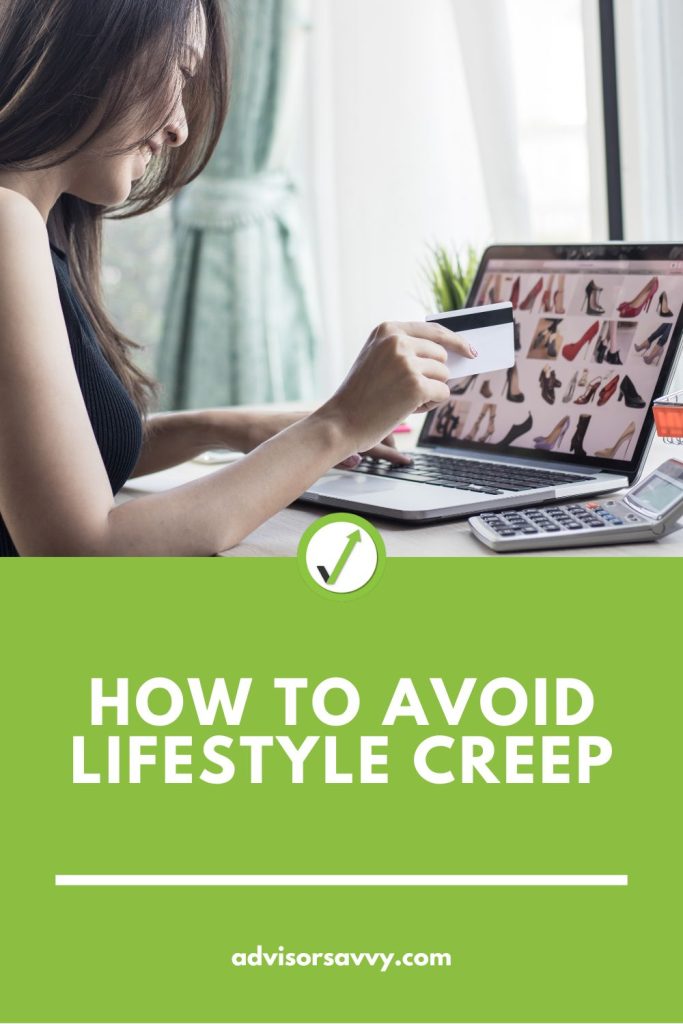
What do you do when you get a new job that pays more? Or a raise in your current job? Do you hang onto your old budget and put the extra cash in your savings account? Or do you treat yourself to the finer things in life you always wanted but couldn’t afford? It’s natural to want to celebrate and reward yourself for doing better. Although, you may take it too far and wonder how to avoid lifestyle creep.
Did you plan how you would use you new salary? Did you prioritize your savings and financial goals? Or have you been trying to keep up with the Joneses — going on more trips than you can safely afford; eating out more often than you used to. Perhaps you’re buying designer clothes and renting a more expensive apartment, or upgrading your car? If this is you, it may be that you’re experiencing lifestyle creep. Keep reading to learn how to avoid it and get back on track with your bigger financial goals!

Table of contents
What is lifestyle creep?
When figuring out how to avoid lifestyle creep, it’s important to know what it is first. As our income increases, our lifestyle expenses naturally increase. This is lifestyle creep. You are now able to afford things you never used to, and you earned it. You got the job, did the work, spent years as broke students. Now you want to enjoy your life and money.
The “creep” aspect is when its unexpected, you’ve spent more of your income than intended. There is less money in your savings accounts and debt is building up as a result of salary increases. You may stray from your financial goals, like saving for a home or putting money aside for retirement. In other words, lifestyle creep occurs when you overspend as a result of an increase in income.

Match to your perfect advisor now.
Getting started is easy, fast and free.
Related Reading: When Does OAS Change to Age 67?
What causes lifestyle creep?
No one wants to live under the tight financial constraints they lived under when they were young. Lifestyle creep is caused by our increased ability to spend as we earn more money. The phenomenon is often known as increased purchasing power. But with lifestyle creep, sometimes it goes too far.
The exact cause of lifestyle creep is often personal. Better jobs and increased pay come with new social pressures. You need to update your wardrobe for your new job. Since you are earning a little more, you don’t absolutely need to go to a thrift store anymore. A lifestyle change here and there is required and understandable. All the lifestyle changes at once is what causes lifestyle creep. Furthermore, it’s the idea that you aren’t picking your battles with what to spend your new money on. You stop shopping a thrift stores, stop bringing a lunch to work, stop taking public transit, get a fancier apartment and so on. Managing what lifestyle changes you will prioritize is one way on how to avoid lifestyle creep.
CIBC Investor’s Line Offer
Up to $6.95 per online stock or ETF trade. Plus, there’s no minimum account balance.
No salary increase can handle all our immediate desires. When we lose sight of our financial health and goals. Many people end up living pay cheque to pay cheque. Read Financial Planning Tips For Students And Young Professionals if you want to set yourself up for a successful financial future. Living Pay Cheque to Pay Cheque and How to Stop will give you some answers on how to shift this situation as well.
Related Reading: Surviving Inflation: Top 7 Tips
What are signs of lifestyle creep?
Lifestyle creep literally creeps up on you so it can be hard to know when it’s happening in yourself or a loved one. Below are some of the common signs of lifestyle creep.
Luxuries Are Now Commonplace
You once dreamed of being able to buy your lunch instead of bringing one with you everyday. Now you buy it everyday and cannot imagine taking a step backwards to bringing a lunch instead. This is a sign of lifestyle creep, when luxuries become commonplace.
Anything you may have once aspired to do but now can’t live without are part of lifestyle creep. For instance, driving to work versus taking public transit or living downtown instead of outside the core. Anything that was once a luxury item or aspirational for you to have has now become standardized to the point you can’t imagine your life without it. This is major sign lifestyle creep is affecting you.
Indiscriminate Spending
Once upon a time you may have thought twice before tapping your credit card. But now you buy fancy coffees everyday; go to the expensive hair salon. Have every online streaming subscription and generally spend money indiscriminately. You have lost the concept of bargain hunting. You may not think its worthy of your time so you do not minimize unnecessary expenses anymore.
Fear of Regression
The worst part about these signs of lifestyle creep is that, even when you look at the numbers, you don’t want to cut back to old financially savvy habits. Cutting back feels regressive, like taking a step back on your quality of life. If you have this fear, it may be a sign that you’re experiencing lifestyle creep. It may also indicate that you need to re-evaluate your relationship with money.
Related Reading: Best Places to Retire in Ontario
How to avoid lifestyle creep
By now, you probably have a good understanding of lifestyle creep and whether or not you’re experiencing it. If you are enduring lifestyle creep, the first step is to not be so hard on yourself. Going through lifestyle creep is a part of money management. It can be exciting to get your first raise or salary bump and sometimes we get carried away. Here’s some tips on how to avoid lifestyle creep, or stop it entirely.
CIBC Investor’s Line Offer
Up to $6.95 per online stock or ETF trade. Plus, there’s no minimum account balance.
Make a budget
It’s easy to want to throw your budget out the window as you start earning more money. This would be the biggest mistake. Instead, revisit your budget and adjust it accordingly. Modify it so you can include some needed lifestyle changes. Remember to continue to include financial goals, like saving for retirement, saving for a house, or emergency funds. A good rule to consider is the 50/50 rule. This rule states that at least half of your increase in income goes towards savings goals. The other half is available to use how you would like. This is the best way to remain mindful while learning how to avoid lifestyle creep.
Don’t make big life changes
It is important that you do not jump into new and more expensive apartments, upgrade cars, or buy expensive designer goods. Once you have an increased income, consider the big changes you may want to make and how spending money on them will genuinely enhance your life. Then, act on them a few months after to have really had the chance to contemplate them. Three to six months is the ideal period to plan for big changes. It allows you to set the goals, revisit the goals, and modify the goals. In this time, you can delegate the money it would take you to make the change into a savings account. This way, you can see if the increased expense is truly worth it and manageable. You’ll also have savings built up to help you with the transition, when you do make that thought out change.
Take some time to consider purchases
Small purchase or impulse buys in store or online add up quickly. They often are not needed or even really wanted. Sometimes it might even be a form of retail therapy. If you see something you want, leave it at the store or unbought on the website. If after 24 hours you still want it, you can consider buying it with a clearer mind. The more time you allow for consideration, the better. 24 hours is a good minimum benchmark, you may want to consider a week or even a month for larger purchases. This way, you know you truly want, will use or even need something. It is no longer impulsive and has become thought out.
Related Reading: Tax Implications for Canadian Snowbirds
Automate save, retirement, emergency funds
Once you get a pay increase, modify how much money is automatically moved to your savings accounts. this includes retirement accounts or emergency funds. Read about financial planning and retirement calculators to help with your decisions. This increases the amount you save each month while also removing the need to think about it. Lifestyle expenses can only consume the money you leave behind to be used. Paying your future self first is a great plan on how to avoid lifestyle creep.
Have friends with similar goals
This isn’t a suggestion to only surround yourself with one type of person, but rather it’s a caution. If you are hanging around with individuals who go out all the time, you will be spending a lot of money. If you surround yourself with money conscience friends who intentionally plan affordable hangouts, you will benefit from this. Thereby effectively avoiding lifestyle creep. You can navigate different social settings. Often, you are who you surround yourself with!
Do not compare yourself to celebrities and social media profiles
Part of the modern dilemma is we see what everyone has and is doing. We are constantly comparing ourselves to celebrities and the posts people make. Do not get caught in this trap! Figure out your finances for yourself. Stay in your lane and do not compare yourself to anything you see online. Chances are, what you see is probably not realistic anyway!
CIBC Investor’s Line Offer
Up to $6.95 per online stock or ETF trade. Plus, there’s no minimum account balance.
Reward yourself where it matters
You deserve to prosper from increases in your income. This includes setting your future self up for success and congratulating your present self. Do something important to you, take a class you always wanted to, have a once-a-month activity, or buy yourself a gift every season. Take pride in staying on track and in earning more money. Financial freedom is combination of discipline and reward. The idea is not to be overly frugal and restrictive, but rather to enjoy your money while also working towards larger goals. It’s all about balance!
Related Reading: What is Inflation?
How much money should you spend on yourself?
Ultimately you are the decider of how to spend your money. It is okay to spend on yourself. It’s required. Makes sure you are spending on yourself both in the present and the future. Prioritize savings with every pay increase. Take your time with changes in your lifestyle. Never feel like you are taking a step back when you prioritize your values over impulsive spending or luxury expenses. Living within your means avoids lifestyle creep and sets you up for success.
Read More: How to Retire Without a Pension in Canada


